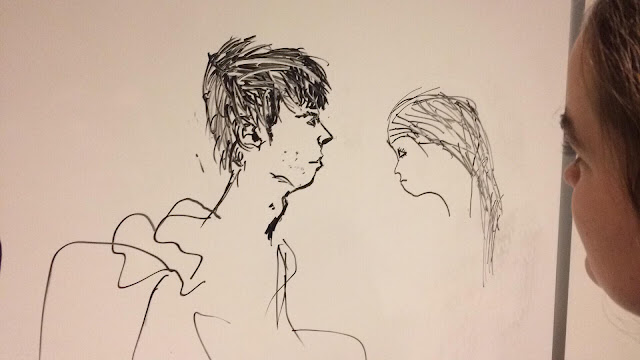There were a lot of interesting characters at the New York State Summer Writer’s Institute, among them a power-lifter and hammer-thrower from Princeton, who explained one night, after the visiting poet’s reading, that weight lifting was the greatest sport there is. People don’t make these kinds of unqualified claims anymore; they make timider arguments, like that weight lifting is a very good sport, or that weight lifting offers something special to certain people. But, being the sort of the bold person you’d expect a Princeton power lifter to be, she went all in and explained why lifting was unequivocally the greatest of all athletic competitions. Apparently, it’s all about how in one simple movement, one single moment, your muscles endure a level of pain and expel a level of energy that they can’t and won’t anywhere else There’s no strategy, no fanfare, nothing but strength presented as simply as possible.
As you might expect, I didn’t like hearing that the apotheosis of all athleticism was something I could hardly do. (At the time, my squat record was 60 pounds. My all-time max now is 100, which is hardly a warmup for her.) Especially as a track athlete, where running 100 meters can score you as many points as running 10,000, I’ve always believed in a certain equality of athletics, that people tend to develop what they’re naturally good at and ignore what they’re not. Some sports take different kinds of effort than others, some offer more acclaim, but they all pose similar challenges, and what you do is more a matter of biology than choice. Now that I think of it, though, this sort of thinking might be more of a cop-out than anything else. People often treat me as something of a masochist when I tell them my favorite race is the 10k, but when they ask me why, I always say that it’s simply what I’m built for, that I don’t have the fast-twitch muscles you need for shorter races. I do well in it so I like it. Simple as that.
But maybe I could use some of the Princeton hammer-thrower’s uncut confidence. Maybe I should argue that the longest race is always the best; not the one that I’m built for or the one I find least offensive, but objectively the best. Because in two days I’ll be racing the 5k for the indoor conference championship, and the 3k the day after that, the two longest races in indoors, and more than anything, it’s because I love them.
When the gun goes off in any short race, every nerve in your body has to scream “Go!” That’s a thrill, I guess, but there’s a different, more interesting feeling at the start of the long race. You still have that primal urge to surge ahead, but instead of obeying it you have to wrangle it, use it, keep it under control. To race well, the front spot has to be something you desperately want, but can’t take, even though it’s open. Because anyone could take that spot. Just about everyone has, sometime in middle school, before you’d learned the unwritten rules of human endurance. That time in middle school you probably dropped out of the race, maybe cried, definitely threw up. So you have to stay restrained and keep the pace, hoping that everyone in front of you has made a mistake and gone out too fast, and that you’ll be rewarded later. And you will, if you keep running the same pace even as your body fails, even as each straightaway stretches longer than the one before. People will wear out and fall behind if you keep a consistent pace. But it takes a long time for that to happen (a 10k takes about half an hour to finish), so, unlike most other races, you have time to think. You have time to get used to your opponents’ backsides, memorize their tattoos and analyze their stride and wonder how long it’ll be before they break and you pass them. Sometimes they pass you back, and it goes back and forth like that, maybe for the entire race, so by the end of it you feel like you have a sort of grudging respect for one another, even though you haven’t exchanged a single word (unless sharp breaths and exhausted groans count). That can’t happen in other races, they just go too fast. But the long races aren’t really races at all; they’re more like wars of attrition, and the best you can do is keep up the pace and wait for everyone else to shut down. At least, until the second or third lap from the end, when everyone forgets about pacing or waiting and burns energy they don’t have trying to get ahead. It becomes sort of like a cruel mirror of the first lap: you feel like you should be able to take the lead, everyone is screaming for you to do just that, but all the power between your bones is sucked dry and all you can do is keep flailing forward, hoping that maybe a second wind will catch you.
Is that a reason why long races are the best? I don’t know. It doesn’t have a thesis statement like the Princeton hammer thrower did, and I don’t have her succinctness either, so in a lot of ways this blog post is worse than her off-the-cuff comment three years ago. But I hope that at least I described that they mean something. Maybe I don't have the confidence to say that they're the best, but they're at least my favorite.


